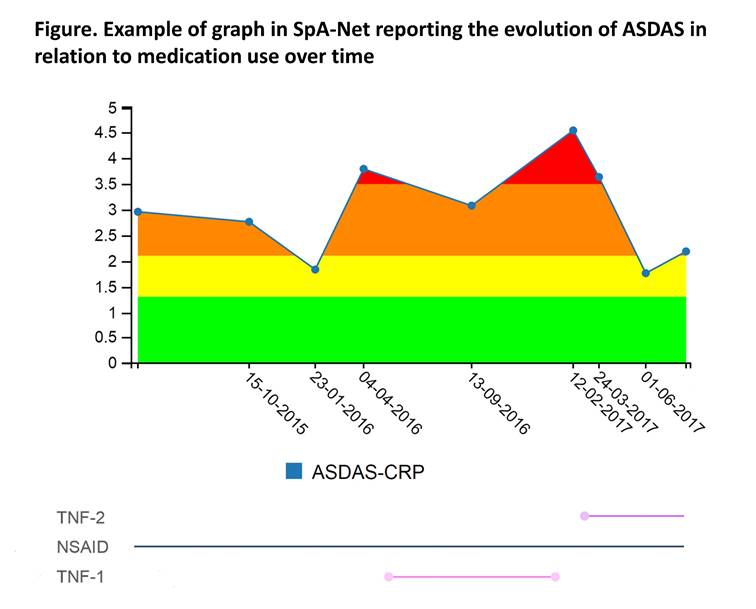Session Information
Date: Monday, October 22, 2018
Title: Spondyloarthritis Including Psoriatic Arthritis – Clinical Poster II: Clinical/Epidemiology Studies
Session Type: ACR Poster Session B
Session Time: 9:00AM-11:00AM
Background/Purpose: Regular and personalised monitoring of disease activity, functioning, medication use and side effects is essential to improve and maintain patients’ health-related quality of life in spondyloartritis (SpA). Transparency on outcomes and efficiency of care are increasingly demanded, and patient-centeredness is considered essential for quality of care. An integrated eHealth system including an electronic patient medical record (EMR) and real-time quality management system could support these aspects of care. The aim of the current study was to develop and test the usability and acceptability of a disease-specific integrated eHealth system and quality registry for SpA in the Netherlands (‘SpA-Net’).
Methods: The eHealth system was developed in four phases. First, content and design were discussed with experts in the field of SpA and patients. Second, the database, EMR and quality management system were developed. Third, multiple rounds of internal and external testing were performed in collaboration with IT specialists, care providers and patients. Fourth, the eHealth system was implemented in practice, usability and acceptability were tested among patients (semi-structured focus interviews) and care providers (feedback meetings).
Results: SpA-Net was designed and developed in 2015 and implemented in May 2016. All patients entered into SpA-Net have a clinical diagnosis of SpA. Information prospectively collected at routine outpatient consultations on diagnosis, demographics, specific SpA manifestations, patient reported outcome measures, clinical outcomes, comorbidities, medication use and safety, supplemented with data from the hospital information system, is directly stored in a database and readily available to care providers. Patients can access an excerpt of these data and complete online questionnaires prior to their visit. The information is presented in graphs wherever possible (Figure). As of May 2018, 1215 patients participated in SpA-Net (mean [SD] age 54.3 [14.5] years, 48.4% females). Focus interviews and feedback meetings were held with 16 patients, 9 rheumatologists, and 5 nurses. Patients considered SpA-Net as an accessible and intuitive system that was beneficial to patient-physician communication and had additional value to current care. Points of improvement were the login process and providing more details about the care provider’s notes. Care providers appreciated the additional information for (preparing) consultations. Barriers against use were the initial time required to adopt the EMR and the quantity of data entry.
Conclusion: SpA-Net enables (tele-)monitoring of patients with SpA and optimizes knowledge and communication among patients and care providers. Both patients and care providers considered SpA-Net acceptable and a valuable addition to current care for SpA.
To cite this abstract in AMA style:
Webers C, Beckers E, van Eijk-Hustings Y, Vonkeman H, van de Laar M, van Riel P, Efde M, Boonen A, van Tubergen A. Spa-Net: A Disease-Specific Integrated Ehealth System and Quality Registry for Spondyloarthritis in Daily Practice in the Netherlands [abstract]. Arthritis Rheumatol. 2018; 70 (suppl 9). https://acrabstracts.org/abstract/spa-net-a-disease-specific-integrated-ehealth-system-and-quality-registry-for-spondyloarthritis-in-daily-practice-in-the-netherlands/. Accessed .« Back to 2018 ACR/ARHP Annual Meeting
ACR Meeting Abstracts - https://acrabstracts.org/abstract/spa-net-a-disease-specific-integrated-ehealth-system-and-quality-registry-for-spondyloarthritis-in-daily-practice-in-the-netherlands/

